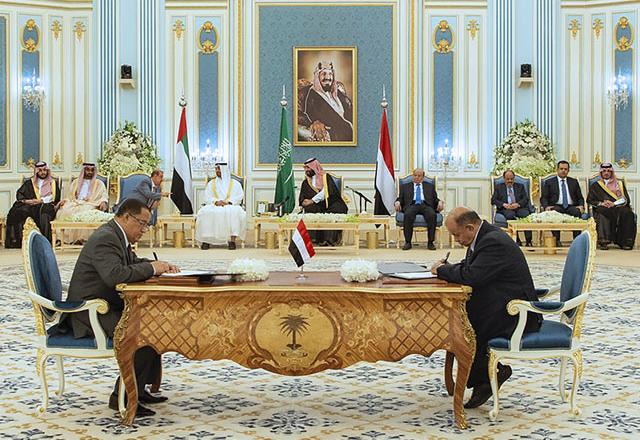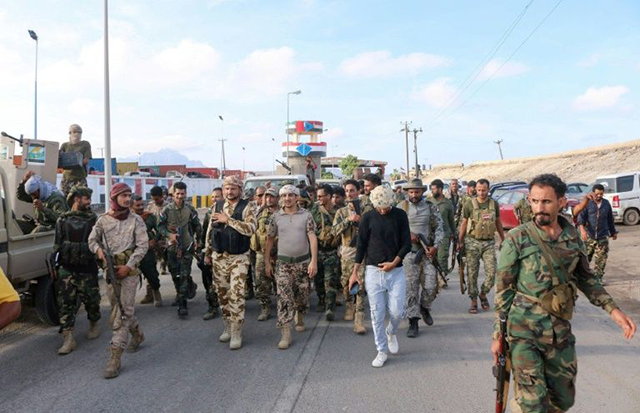You are here
'Yemen deal on brink of collapse'
By AFP - Jan 16,2020 - Last updated at Jan 16,2020
ADEN — The leader of Yemen's southern separatists has warned against the looming collapse of a power-sharing deal, saying the region is menaced by the twin threats of economic catastrophe and extremist attacks.
The agreement to resolve a battle for control in the south, which was signed in Riyadh last November, was hailed as a step towards ending the wider conflict in Yemen that pits the government against Iran-backed Houthi rebels.
However, analysts have said it is effectively defunct, having failed to meet deadlines for key measures including the formation of a new Cabinet with equal representation for southerners, and the reorganisation of military forces.
In an interview with AFP, Aidarous Al Zoubeidi, who heads the secessionist Southern Transitional Council (STC), said he was committed to the deal "under the leadership of Saudi Arabia" which leads a military coalition against the Houthis.
Zoubeidi said the agreement, which observers had welcomed as preventing the complete break-up of Yemen, united the south against the Houthis and recognised the STC as a legitimate party.
“We consider the Riyadh Agreement an important political step, because we gained regional and international recognition,” he said as he sat behind his desk in the main southern city of Aden in front of the flag of the formerly independent south.
‘People are suffering’
In August, deadly clashes broke out between the government and STC forces who seized control of Aden, ousting unionist forces who had set up base there when President Abed Rabbo Mansour Hadi fled the Houthi-held capital Sanaa in February 2015.
While the government and the STC are technically allies in the long war against the Houthis, the secessionists believe the south should be an independent state — as it was before unification in 1990.
However, Zoubeidi said they were willing to set aside that goal as the allies focused on the fight against the Houthi rebels, which had threatened to be derailed by the power struggle in the south.
“We do not aspire during this phase for independence, we aspire for partnership... and the right to choose our own fate through democracy,” he said.
The troubled rollout of the deal comes against amid what Zoubeidi said was a dire situation in the south of Yemen — a country which the grinding conflict has pushed to the brink of famine.
“There is a shortage of food products, the warehouses are empty in the south and there are only reserves to cover the needs of the people for the next 10 days,” he said.
“People are also suffering from not getting their salaries,” he said, referring to a chronic lack of funds to pay public sector employees.
Zoubeidi said that Yemen’s currency was sharply depreciating, and that it was possible that in the next few months the rial would be abandoned in favour of the Saudi or US currencies “because it will have no value”.
Threats loom
Zoubeidi said that “many threats” loom large over the Riyadh Agreement, but the most critical was intensified activity by militant groups including the Muslim Brotherhood, which he said was working “under the cover” of the government.
The tussle for control of the south, dubbed a “civil war within a civil war”, exposed divisions between the coalition partners — Saudi Arabia which backs the government, and the United Arab Emirates which has backed and funded the STC.
“These terrorist organisations threaten the Riyadh Agreement because they are terrorist organisations that will conduct terrorist activities that may lead to the failure of the deal,” Zoubeidi said.
The Riyadh Agreement set a timetable for the government’s return to Aden, the appointment of a new head of security and a governor of the city, and the formation of a new 24-member Cabinet with equal representation for southerners.
Yemen’s Prime Minister Maeen Abdulmalik returned to the city in December but the two sides have failed to meet the other deadlines.
Around 3.3 million people have been displaced by the Yemeni conflict and some 20 million — more than two-thirds of the population — need help to survive what the United Nations has described as the world’s worst humanitarian crisis.
Related Articles
RIYADH — Yemen's southern separatists have struck a power-sharing deal with the internationally-recognised government aimed at ending a conf
RIYADH — Yemen's internationally recognised government signed a power-sharing deal with southern separatists Tuesday, in a Saudi-brokered in
ADEN — Yemeni separatists early Sunday declared self-rule of the country's south as a peace deal with the government crumbled, complicating


















